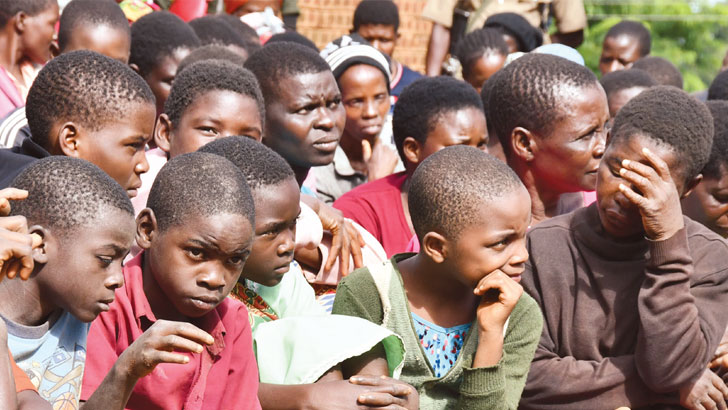It has emerged that some survivors of Tropical Cyclone Freddy seeking refuge in various evacuation camps have stayed four days without food.
Random interviews with district commissioners (DCs) in the affected districts revealed that the Department of Disaster Management Affairs (Dodma) only started distributing relief items including unprocessed food, yesterday four days after survivors moved to camps.,
The checks also showed that most of the evacuation camps, especially in rural areas lack access to potable water, a development that also exposes the survivors to the risk of contracting waterborne diseases.
Phalombe DC Douglas Moffat in an interview yesterday expressed worry that since Monday no one had received relief food in the district’s camps.
He said about 14 600 people were in 45 evacuation camps and that the figure was likely to rise as the council was failing to reach out other areas such as traditional authorities (T/As) Jenala, Nkhulambe, Chiwalo and Nyambalo due to impassable roads.
Children at Thangadzuwa Primary School camp in Thyolo where food
items were only delivered yesterday
Moffat said: “We don’t know the state of these people in the said areas. But for the 14 600 people, they haven’t received anything to eat since they were evacuated to the camps. What they urgently need is food.
“But now I am relieved that today [yesterday] we have received relief items from Dodma which include maize, maize flour, beans, and blankets. Possibly this evening or tomorrow [today] we will start the distribution.”
His Zomba counterpart Reinghard Chavula said the situation was also similar in some parts of the district as the cyclone survivors were yet to receive food assistance.
She said the most affected survivors were those in T/As Mwambo and Kuntumanji as well as Sub T/A Ngwelo who have not received food items since their evacuation.
Said Chavula: “Most of the well-wishers have just made pledges, but they are yet to honour their pledges except for Dodma which has assisted us with maize, beans, blankets.
“Some individuals and Chanco [University of Malawi] students assisted us with clothes. With maize, the challenge is that we don’t have electricity in some parts of Zomba to have it milled into flour.”
In Nsanje, district disaster and relief officer Patrick Sipuni said in an interview maize distribution to camps started yesterday after collecting it from Dodma warehouse at Bangula.
However, he said there was need for money to mill the maize as well to buy relish, cooking oil and kitchen utensils for the camps.
So far, Nsanje has recorded 12 deaths and 12 injuries with 16 others missing. There are 14 494 households that have been displaced and seeking shelter in the 44 established camps in the district.
In a separate interview, Blantyre District Council chairperson Akima Chipwatali expressed concern that well-wishers are focusing more in Blantyre City, especially Naotcha Primary School camp in Chilobwe Township, leaving other survivors in Blantyre Rural. in need of food assistance
She said most of the evacuations camps under Blantyre District Council such as Chigumula, Chileka, Lunzu, Lundu, Chigwaja and Milare as well as some in the city were yet to receive any relief items.
Chikwawa district disaster desk officer Humphrey Magalasi also said food is the main challenge in the district’s 21 camps hosting 12 000 displaced households.
Speaking during a Dodma briefing in Blantyre last evening, United Nations resident coordinator Rebecca Adda-Dontoh said it was heartbreaking to see that people in the camps are literally sleeping on the floor.
She said: “Cyclone Freddy has taken away human dignity. We need to assist these people with resources so that they claim back their dignity.
“People are also traumatised and the UN and its partners will have a conversation and see how we can help in terms of mental health.”
Meanwhile Blantyre, Phalombe and Thyolo district health offices (DHOs) have called for urgent need of additional health personnel and medical supplies to support the cyclone survivor patients in evacuation camps.
Blantyre district director of health and social services (DHSS) Gift Kawalazira said his office has set up 43 additional clinics in all the 43 camps in the district.
He said: “Therefore, you can see that these camps are an extra strain on the resource envelope that we had in as far as medical supplies are concerned.”
Phalombe acting DHSS Sam Siwakwe in a separate interview said the situation is worse in the district as about three health centres have been swept by floods.
He said the district needs urgent additional healthcare workers comprising 30 clinicians and 40 nurses as well as essential medical drugs.
On his part, Thyolo DHSS Arnold Jumbe said his office is in need of fuel to run generators in various health facilities including Thyolo District Hospital as most of them have been without Electricity Supply Corporation of Malawi power since Friday.
The Nation spot-checks on Wednesday also established that camps in Blantyre City had fewer toilets against the population.
Mean while , Dodma commissioner Charles Kalemba last evening conceded facing challenges to reach out to survivors with relief items largely due to accessibility challenges.
He said two helicopters Zambia has offered will ease the problem and help them rescue those trapped.
By yesterday, the death toll stood at 326 with 796 injuries and 201 missing while 1 044 had been rescued. The disaster has displaced 40 702 households
The post Tough life in camps first appeared on The Nation Online.
 Moni Malawi
Moni Malawi 

